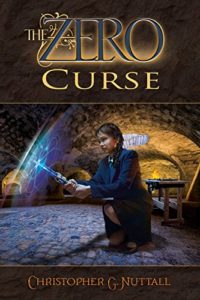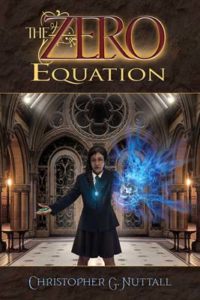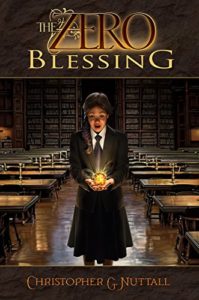The Story of The Zero Enigma
Article by Chris Nuttall
One of the things that has always annoyed me, as a reader of fantasy books, is the prevalence of ancient artefacts that just happen to be more powerful than anything that exists in the present day. The One Ring is marginally justified, I suppose, but the Deathly Hallows are just annoying. We might not know everything about how the Romans built roads, bridges and weapons, but would we consider our roads, weapons and suchlike to be automatically inferior? Indeed, I cannot imagine sorcerers in a fantasy world not trying to figure out ways to duplicate, then improve upon older artefacts. And yet, relatively few works feature sorcerers who do just that.
It was this that galvanised me to show, in the Schooled in Magic books, a steady progression of magical knowledge from the relatively primitive Whitehall Commune (Past Tense) to the more modern spells and suchlike that Emily learns when she entered the Nameless World. I simply could not work out a reasonable reason for knowledge to be lost, certainly not on such a huge scale. The Black Magician books do feature knowledge being deliberately destroyed, as well as other old secrets that were forgotten, but I didn’t find it believable. Why would everyone give up the secret when it would give them an overwhelming advantage?
And then, midway through Love’s Labour’s Won (Schooled in Magic VI) I worked out a way that ancient artefacts could exist, but with the knowledge used to create them being lost. I went backwards and forwards for a long time, trying to find a way to slot the new idea into the well-established series … and failed. The new idea simply wasn’t compatible with the old one. Perhaps, if I’d had it right at the start … I shrugged, scribbled the idea down for later consideration, then went on to write more books.
A couple of years later, I went through my list of ideas and dragged this concept back out into the light. I wanted to expand my reader base and explore some ideas that couldn’t be included in Schooled In Magic. Once separated from SIM, the idea expanded rapidly into a complete backstory – some of which is mentioned here, some of which will be explored in the next two books – and a universe of its own. Eventually, I had to write it.
 I’ve always been fascinated by how societies change, for better or worse, when new ideas and concepts are introduced … or lost. What would happen, I asked myself, if magic was effectively as universal as music? There would still be great magicians, as there are great musicians, but there wouldn’t be such a tight barrier between the magical world and the muggles. Most people would know – and use – a few simple spells, even if they don’t understand how they work. What sort of world would this create?
I’ve always been fascinated by how societies change, for better or worse, when new ideas and concepts are introduced … or lost. What would happen, I asked myself, if magic was effectively as universal as music? There would still be great magicians, as there are great musicians, but there wouldn’t be such a tight barrier between the magical world and the muggles. Most people would know – and use – a few simple spells, even if they don’t understand how they work. What sort of world would this create?
And what would happen if someone couldn’t use magic at all?
I originally intended to start with an Emily-like character, someone from our world. She would look normal, to the inhabitants of the new world, but she would have no magic. This would eventually turn into a source of strength, yet – at first – she’d feel utterly helpless amongst magicians. I poked at it for a while, then decided it wouldn’t work. There was no point in sending a powerless Emily to Whitehall if she can’t do magic and no one has any idea that there might be someone else she could use.
And besides, I’d already done the dimensional traveller story.
I needed a reason for the heroine to go to magic school, even though she was effectively a squib. I toyed with the idea of her tricking everyone into letting her go, but the more I worked on it the less likely it seemed that she’d succeed. Then I decided on a society where everyone had at least some level of magic, save for our heroine. The characters in the story would assume she was merely a very low-level magician, not a squib. And, if there was even the faintest chance she’d develop magic, they’d want her to try.
Slowly, the Great Houses took shape. Basic magic would be very common in their society, but the more advanced spells would be largely controlled by the magical aristocracy. I saw it as the difference between using a website designer (like Microsoft Expression) and actually learning to code in HTML (or whatever) yourself. The former is simpler; the latter offers more control, if you have the time and patience to master it. Their society would be very formal in many ways, drawing inspiration from Victorian and Edwardian times as well as others. It would be, in some ways, a far more equal society than either of them, as women have equal powers to men. In others, it would be very different.
And then Caitlyn Aguirre – and her sisters – slowly started to take on shape and form.
Many years ago, I met a student at university. She was wheelchair-bound (I believe she couldn’t move anything below the waist) and … well, I wouldn’t have blamed her for giving up on life. She was Somali, I believe; an accident of fate had ensured that she could neither live a traditional life within her community nor find it easy to live outside it. And yet, she persisted in the truest possible sense. She didn’t let the bad hand she’d been dealt overcome her. She worked hard, she studied … I like to think she got a job where her intelligence and determination was appreciated, despite her disabilities.
I liked her. More to the point, I respected her. And Cat is based – to some extent – on her.
 It is a fundamental truth that some people face many difficulties in their lives. That’s simply what happens. Some of those problems are internal – poor health – and others are external; abusive parents, limited income, crime-ridden areas. But true worth lies in finding a way to overcome those problems and triumph over adversity. A story of someone who succeeds in life is one I would find inspiring.
It is a fundamental truth that some people face many difficulties in their lives. That’s simply what happens. Some of those problems are internal – poor health – and others are external; abusive parents, limited income, crime-ridden areas. But true worth lies in finding a way to overcome those problems and triumph over adversity. A story of someone who succeeds in life is one I would find inspiring.
Cat was an odd character to write, for many reasons. She’s four years younger than Emily was, when she started her adventures. She combines the knowledge of her family with a painful teenage insecurity, something made worse by the grim awareness that she’s powerless, that she’s effectively a squib. The limits to her knowledge – like most young teens, she has no idea of the limits of her knowledge – actually weaken her. She thinks that magic is the be-all and end-all of life and spends most of her time trying to study it, to grasp it for herself, but she doesn’t have the perspective to realise that there is a life outside of magic or the experience to realise that magic doesn’t quite work right around her.
And, despite her disability (and it is a disability), Cat manages to keep going.
Once I had the core of her family, and crafted a set of friends and enemies, I worked out the first story. Cat would have no luck, of course, with traditional magic, but she’d slowly start to figure out that she could do some things. And then, as she was taught to follow something closely-akin to the scientific method, she would eventually figure out an aspect of the truth and solve the mystery behind the Objects of Power. And then she would find herself dealing with the repercussions.
This meant that she had to go up and down the emotional spectrum like a yoyo. She nearly kills herself when Rose, a common-born student with no schooling in magic, brews a perfect potion … something Cat can’t do. She even urges Rose to befriend other kids, if only to keep Rose from getting caught in the middle when Alana and Isabella torment Cat. And then, when she discovers what she can do, she becomes a little arrogant. A couple of readers insisted that the mistake that led to Cat being kidnapped was a stupid one, but it’s the sort of thing people do when they allow their success to go to their heads. And then she’s more reluctant to risk upsetting the apple cart again.
Cat is not wholly a good person, but she’s human.
The entire story is told from Cat’s POV, but I had fun crafting the supporting cast too.
Cat’s family is something of a mess, as you may have noticed. Her parents really don’t want to think their daughter has no magic, so they spend a great deal of time trying to force some magic out of her. Alana thinks that Cat’s lack of magic will actually hamper the entire family – whatever stripped Cat of magic might be catching – while Belladonna is simply lazy (more accurately, she’s given up trying to compete with Alana, the presumed Heir Primus.) And her Great Aunt is a poisonous shadow lurking in the background.
Rose was meant to be Cat’s opposite – a common-born student who had magic, but didn’t know what to do with it. And, because she was common-born, she was also more practical than Cat, to the point where she had no patience with Cat feeling sorry for herself. Isabella, on the other hand, saw Cat as a rival from the start, a dangerous problem for Cat when Isabella had magic and Cat had none. Isabella assumed that Cat had to be knocked down a peg or two or she’d started building up a patronage network of her own, which would make her a greater rival in the future. She was, of course, dead wrong. (She would probably have been better setting herself against Alana.)
Indeed, Isabella and her brother, Akin, have a somewhat tragic relationship. Akin is the Heir Primus, the heir to the family itself, but he doesn’t want to be … while Isabella, who does want the coveted role, is denied it because she is a girl. It poisoned their relationship and, worse, allows Isabella to be manipulated. It’s something I explore in Book IV, The Family Shame.
A reader once asked if I regretted not having the idea behind this story in time to insert it into Schooled In Magic. Now, I don’t. It’s grown into a universe of its own, with four books written and at least four more to come <grin>.
*


Leave a comment